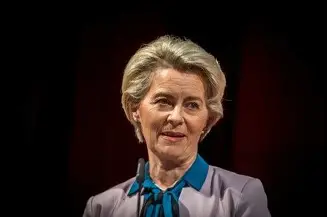Italy is weighing whether to keep details of state flights secret following the alleged jamming of satellite signals on an aircraft carrying the European Commission president, Ursula von der Leyen, by Russia.
Von der Leyen, a vocal critic of Vladimir Putin and Moscow’s war in Ukraine, was travelling to Bulgaria on Sunday when her chartered plane lost satellite navigation support. The failure delayed its arrival in Plovdiv and forced it to circle for nearly an hour.
The incident has prompted renewed debate among EU member states over how to protect leaders’ flights from electronic interference. Since Russia’s full-scale invasion of Ukraine in 2022, GPS jamming and “spoofing” have risen sharply.
Italian defence ministry sources said Rome was considering steps to classify ministers’ flights, restrict information on the prime minister’s office website and prevent specialist tracking services from displaying flight paths. Defence minister Guido Crosetto first proposed tighter controls earlier this year, as jamming incidents became more frequent near Russian borders.
European airspace has already seen a series of disruptions. Latvia reported three hotspots of interference along its frontier with Russia in August. A Finnish carrier suspended flights to Tartu in Estonia in April, while a British defence secretary’s aircraft suffered jamming near Russian territory in March.
Current Italian law requires the publication of ministers’ travel, including flights, on the government’s website. Officials say Rome would continue to seek diplomatic clearance for overflights, but could soon withhold public disclosure. In February, the prime minister’s plane was removed from Flightradar, although it remains visible on other sites. Officials are now considering blocking all cabinet flights from public tracking platforms.
According to Associated Press data, almost 80 incidents of electronic disruption have been recorded across Europe and attributed to Russia. Britain’s foreign intelligence chief described the campaign as “staggeringly reckless”.
Moscow has rejected claims it was behind the failure on von der Leyen’s flight. Kremlin spokesman Dmitry Peskov said: “Your information is incorrect.”
Nato secretary general Mark Rutte said on Tuesday the alliance was taking the interference “very seriously”. He added that Nato was working “day and night” to counter jamming and prevent further incidents.



